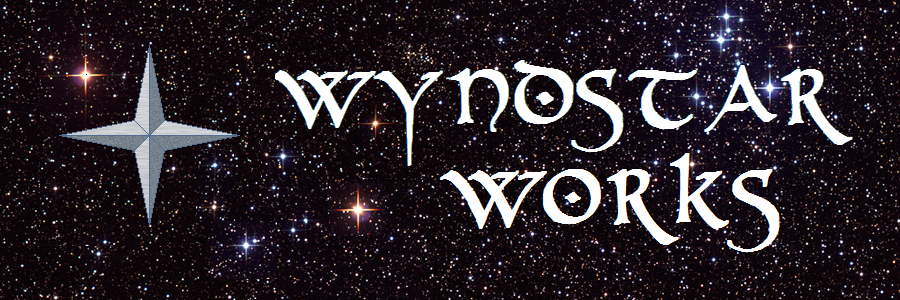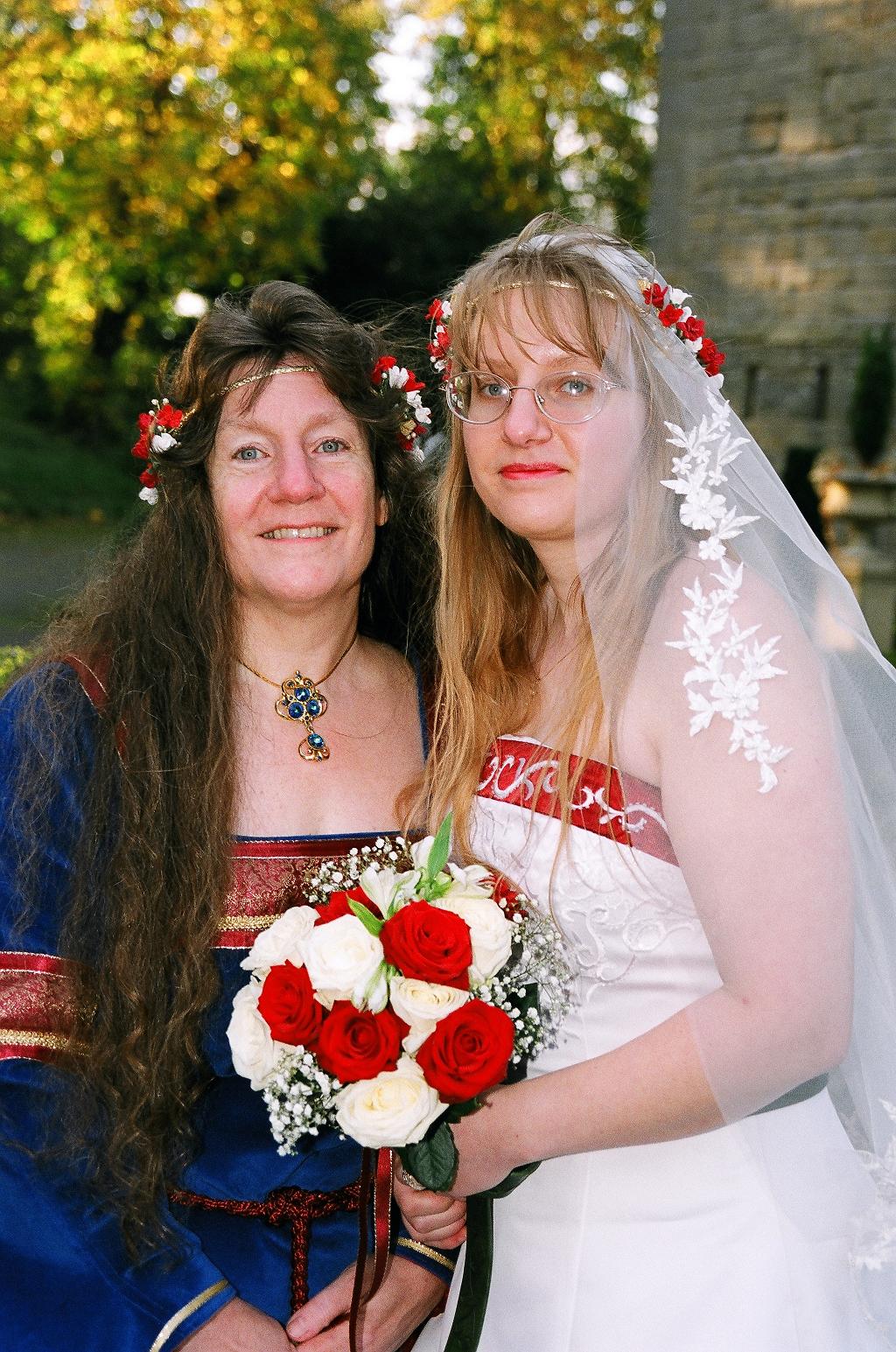The Wyndstar Haggadah
Since the late 1970s, we (Coral and Thomas) have hosted a Christian Passover celebration each year in our home for our family and invited guests. At nearly every celebration we have tried to include at least one new guest who has never participated before. These celebrations reached their peak in the late 1990s with over 20 guests in attendance. On rare occasions we have also been invited to host larger gatherings in local churches (in both America and Britain).
The Wyndstar Haggadah (The "telling" and acting out of the Passover story), researched and compiled by Coral from various Jewish and Christian sources in the early 1980s, combines both modern and ancient elements of the Passover, along with Christian understandings and interpretations of this 4000-year-old feast. For instance, although modern Jews no longer eat lamb at Passover, this was the ancient practice until after the Middle Ages, and is revived in our Wyndstar celebrations in order to make this meal as similar as possible to Jesus' own Last Supper.
Integral to these more than thirty Passover celebrations has been appropriate music to set the mood for the meal. For us, this has invariably been recordings by the group Lamb (first discovered by Coral in New York in the early 1970s), whose blending of Jewish folk styles, Hebrew lyrics, and Christian message has provided the perfect background for our Christian Seder (the Passover ritual). One of the indelible memories of our household is the preparation for the Passover, where the air is permeated with the aroma of Coral's unleavened bread and the joyous melodies of Lamb!
We present here Coral's unique Passover recipes and the Wyndstar Haggadah itself, providing the pattern we follow in our annual observances of this feast. One important part of the retelling of the Passover story is the recounting of the ten plagues God sent against the Egyptians. To remember these plagues, and in keeping with the family-oriented nature of the occasion, Coral along with her two daughters created colored pencil illustrations of the ten plagues which are displayed one by one as the plagues are enumerated.
Wyndstar Passover Menu
[A few other items which are not traditionally part of the meal, but which we do serve, are Grape Juice (for children), Mint Jelly (to accompany the Lamb) and an assortment of Fresh Fruit (including Pomegranates, if possible). Other accompaniments to this ancient meal would also include Dried Fruit, such as Figs and Dates, and Nuts, such as Almonds. Hard-cooked Eggs may also be served, as this is in continuity with the Easter celebration and rites of Spring.]
Lamb
Whole Leg (one entire Leg should feed about 6 people). [Or use individual Leg Steaks or Lamb Chops, allowing at least one per person].
Preheat oven to 325. Place Leg of Lamb, fat side up, on rack in shallow roasting pan. Season with salt and pepper. Roast about 35 minutes per pound (for example, a 6 lb. Leg of Lamb should cook for 3 and 1/2 hours). Brush Lamb with Spicy Glaze during last hour of roasting.
Mama Mosbø's Spicy Lamb Glaze
Combine all ingredients for Spicy Glaze and brush on Leg of Lamb during last hour of roasting. May be used on other Lamb cuts. [Serve with Mint Jelly.]
Kosher Sweet Concord Wine
At least 1 bottle (1.5 Liters) of Kosher Concord Grape Wine. The label should say "Kosher For Passover." If all else fails, any Red Wine made from Grapes can be used. [Welch's Grape Juice may be served in place of the Wine for children or for those who prefer a non-alcoholic beverage. Also provide Water for drinking.]
Greens (Parsley)
One large bunch of Parsley, washed and trimmed, and separated into individual (bite-sized) clumps.
Salt Water
Mix 3/4 teaspoon Salt into 1/2 cup of Water. [Water should taste very salty, to represent tears.]
Bitter Herbs (Horseradish)
Be sure it's a pure Horseradish sauce, not one with a mayonnaise mixture. [It should have quite a hot bite to it.]
Mama Mosbø's Matzah (Unleavened Bread)
Preheat oven to 350. Combine Salt and Flour. Add Olive Oil and Honey, and work them into the Flour mixture (with the back of a fork, pressing the clumps against the sides of the bowl, through the prongs of the fork) to form a fine meal. Then add the cold Water and work it into the meal with the fork (if the mixture seems too dry, add a little more cold Water). When the mixture begins to form a dough, turn it out onto a well floured surface, and kneed it for about 5-10 minutes until it forms a smooth round ball. Flatten the ball into a 1 inch thick round loaf. Place the loaf onto an ungreased baking sheet and bake for about 25-30 minutes on each side (total cooking time is about 1 hour).
Make at least 3 loaves.
Also provide commercially available Matzah Crackers (or Carr's Water Crackers) as an additional Matzah variety (for use with the Horseradish Bitter Herbs).
Charoseth (Spicy Apple and Raisin Salad)
Combine all ingredients. Cover and refrigerate the Charoseth for several hours, to allow the spices and wine to blend in.
This meal will feed about 6 people. Increase the amounts of each item on the menu if more people will be attending. Be sure to have at least two Candles, fresh Flowers, and don't forget to set an extra place at the table for Elijah (however, you only need to fill his Wine glass). Enjoy a blessed Passover!
The Wyndstar Haggadah - A Christian Seder for Passover
Note: Hebrew prayers have been transliterated by Thomas using his own system. It is our practice to say each prayer in Hebrew, followed by its English translation.
1. Lighting of the Festival Lights: (Blessing of the Fire)
Woman of the household lights the candles, and says:
Barukh atah, Adonay Eloheynu, Melekh ha-olam, bore m'orey ha-esh.
Blessed are you, O Lord our God, King of the Universe, Creator of the radiance of fire.
You have sanctified us by your commandments and have commanded us to kindle the festival lights.
Blessed are you, O Lord our God, King of the Universe, who has preserved us, sustained us, and brought us to this holy Season. May our home be consecrated, O God, by the light of your countenance, shining upon us in the blessing, and bringing us peace.
2. Qiddush (Qaddesh): (Blessing of the Wine)
Head of the household (the leader) elevates the cup of wine, and says:
Barukh atah, Adonay Eloheynu, Melekh ha-olam, bore p'riy hag-gaphen.
Blessed are you, O Lord our God, King of the Universe, Creator of the fruit of the vine.
Blessed are you, O Lord our God, King of the Universe, who has chosen us among all people, and sanctified us with your commandments. In love you have given us, O Lord our God, solemn days of joy and festive Seasons of gladness, even this day of the feast of the unleavened bread, a holy convocation to us, a memorial of the departure from Egypt. You have chosen us for your service, and have made us sharers in the blessing of your holy festivals.
All drink the first cup of wine (take the first sip).
3. Ur'chats: (Washing of the Hands)
This section may be omitted.
Only the head of the household washes his hands at this point. The washing is done without a blessing. This is a symbolic act of purification, which precedes the participation in any religious ritual.
Have a washing bowl of water and towel taken to the leader so that he may symbolically wash his hands.
4. Kar'pas: (Blessing of the Greens)
The leader picks up the greens (parsley), and says:
Barukh atah, Adonay Eloheynu, Melekh ha-olam, bore p'riy ha-adamah.
Blessed are you, O Lord our God, King of the Universe, Creator of the fruit of the soil.
Passover, in ancient times, was a celebration of Israel’s exodus from Egypt as well as an agricultural festival and an occasion on which our ancestors gave thanks for the Earth's rich bounties. The parsley is symbolic of the greening of new life in Spring, and we dip it into the salt water to remind us of the bitter tears of slavery.
All eat the parsley dipped in the salt water.
5. Yachats: (Breaking of the Matzah)
The leader takes a loaf of Matzah (unleavened bread), and says:
Lo, this is the bread of affliction which our fathers ate in the land of Egypt. Let all who are hungry come and eat. Let all who are in want come and celebrate the Passover with us. May it be God's will to redeem us from all trouble and from all servitude. Next year at this Season, may the whole house of Israel be free.
The leader breaks the Matzah in half, and replace it between the remaining two whole Matzahs. Be sure to keep one half of the broken Matzah hidden to be used after the meal. This is the afikomen (the desert), and for our Wyndstar gathering will be used for the Barekh.
6. Maggiyd: (The Four Questions and the Haggadah.)
* The Four Questions:
Traditionally asked by the youngest member of the household who can read (or by any children), and answered by the head of the household (or by any adult). Note: Since the answer has been lost to the original Fourth Question ("Why do we eat Lamb on this night?"), the modern Fourth Question about reclining is asked instead.
Question #1: Why is this night different from all other nights? On other nights, we eat leavened bread. Why do we eat only Matzah, the unleavened bread, on this night?
Answer #1: We eat Matzah because this reminds us how, in the haste of their departure from Egypt, our fore¬fathers had to take along unleavened dough, since they did not have time to let it rise.
As we read in the Torah (Exodus 12:34): "So the people took their dough before it was leavened, with the kneading bowls wrapped up in their cloaks."
And (Exodus 12:39): "They baked unleavened cakes of the dough that they had brought out of Egypt; it was not leavened, because they were driven out of Egypt and could not wait, nor had they prepared any provisions for themselves."
Question #2: On all other nights, we eat many kinds of herbs. Why do we eat only bitter herbs on this night?
Answer #2: At the Passover, we eat bitter herbs to remind us how bitter the Egyptians made the lives of our forefathers in Egypt.
For we read (Exodus 1:13-14): "The Egyptians became ruthless in imposing tasks on the Israelites, and made their lives bitter with hard service in mortar and brick, and in every kind of field labor. They were ruthless in all the tasks that they imposed on them."
At the first Passover, the Lord instructed the people of Israel (Exodus 12:8): "They shall eat the lamb that same night: they shall eat it roasted over the fire with unleavened bread and bitter herbs."
Question #3: On all other nights, we do not dip our herbs. Why do we dip herbs twice on this night; one in salt water, and one in Charoseth?
Answer #3: We dip the parsley into salt water to replace tears with gratefulness, and we dip the bitter horseradish into sweet Charoseth as a sign of hope. We dip these herbs to remind us that our forefathers were able to withstand the bitterness of slavery because it was sweetened by the hope of freedom.
Question #4: On all other nights we eat sitting. Why may we recline on this night?
Answer #4: To recline at mealtime during ancient days was a sign of freedom. On this holy night, we may demonstrate our sense of complete freedom by reclining at the table.
* The Haggadah: (The story of the Exodus)
May be read by anyone. As each of the 10 plagues are mentioned, we dip a finger into the wine (symbolizing our joy) and spill a drop onto our plate, to show our compassion for the suffering of the Egyptians.
Long ago the Children of Israel lived peacefully in the land of Egypt. But a cruel Pharaoh came to the throne and made slaves of them all. The Hebrew people worked hard for many years, and prayed for their freedom. In answer to their prayers, Moses was born.
However, the Pharaoh had ordered the death of all the Jewish babies since he had become afraid of the growing strength of the people. But Moses' mother hid her son in a cradle of reeds in the Nile, praying that the Lord would protect him. Pharaoh's daughter found the child, and adopted him as her son.
One day, after Moses had grown to manhood, he saw an Egyptian soldier beating an Israelite. Outraged by such cruelty, Moses killed the soldier, and then ran away to the land of Midian.
For many years, Moses lived in Midian with his wife, Zipporah, and their children. He prayed for his people. One day, as Moses tended his sheep, he came to Horeb, the mountain of the Lord, and saw a bush that was on fire but that didn't burn. A voice called out to him from the bush, and he answered it. He knew it was the Lord. The Lord told Moses to ask the Pharaoh to free the Israelites and then to lead them to Canaan, the Promised Land.
Moses journeyed back to Egypt where a new Pharaoh now ruled. But he too, would not let the Hebrew people go. So the Lord punished the Egyptians with nine plagues: with Blood, Frogs, Lice, Wild Beasts, the Death of Livestock, Boils, Fiery Hail, Locusts, and with Darkness.
* The Ten Plagues:
A set of colored pencil illustrations drawn by Coral and her two daughters in 1990:
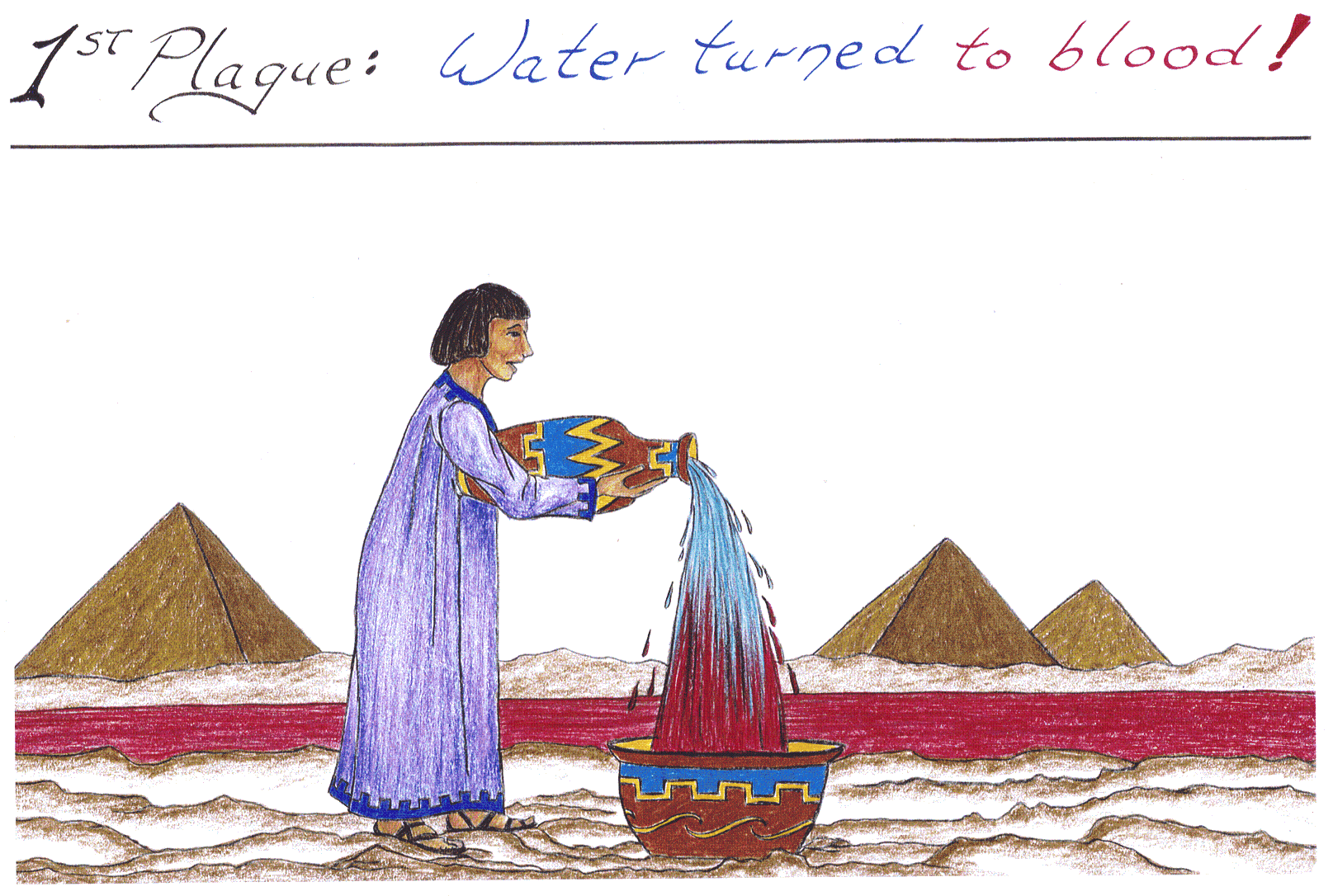
The First Plague - Exodus 7:14-25 (drawn by Coral)
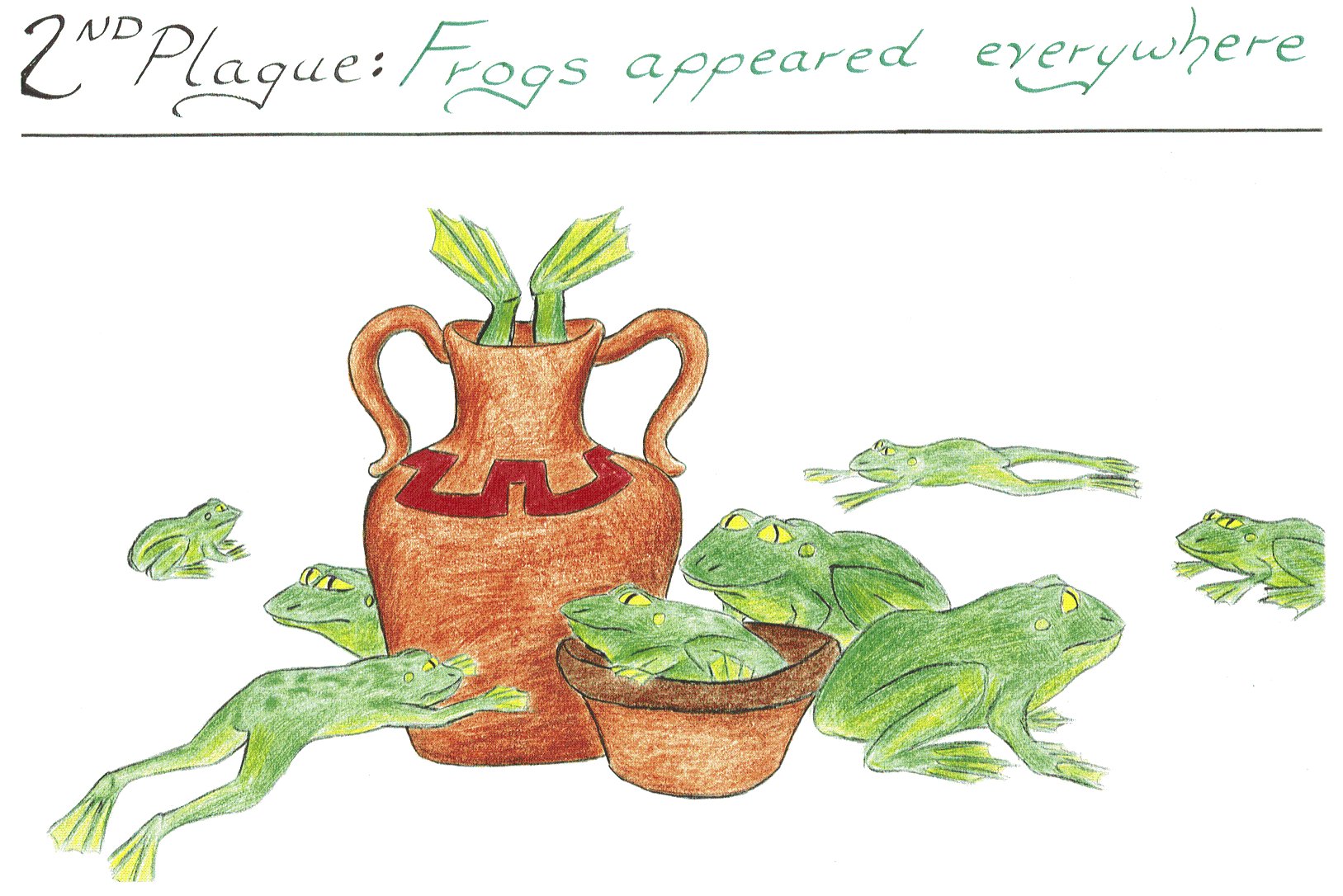
The Second Plague - Exodus 8:1-15 (drawn by daughter Rachel)
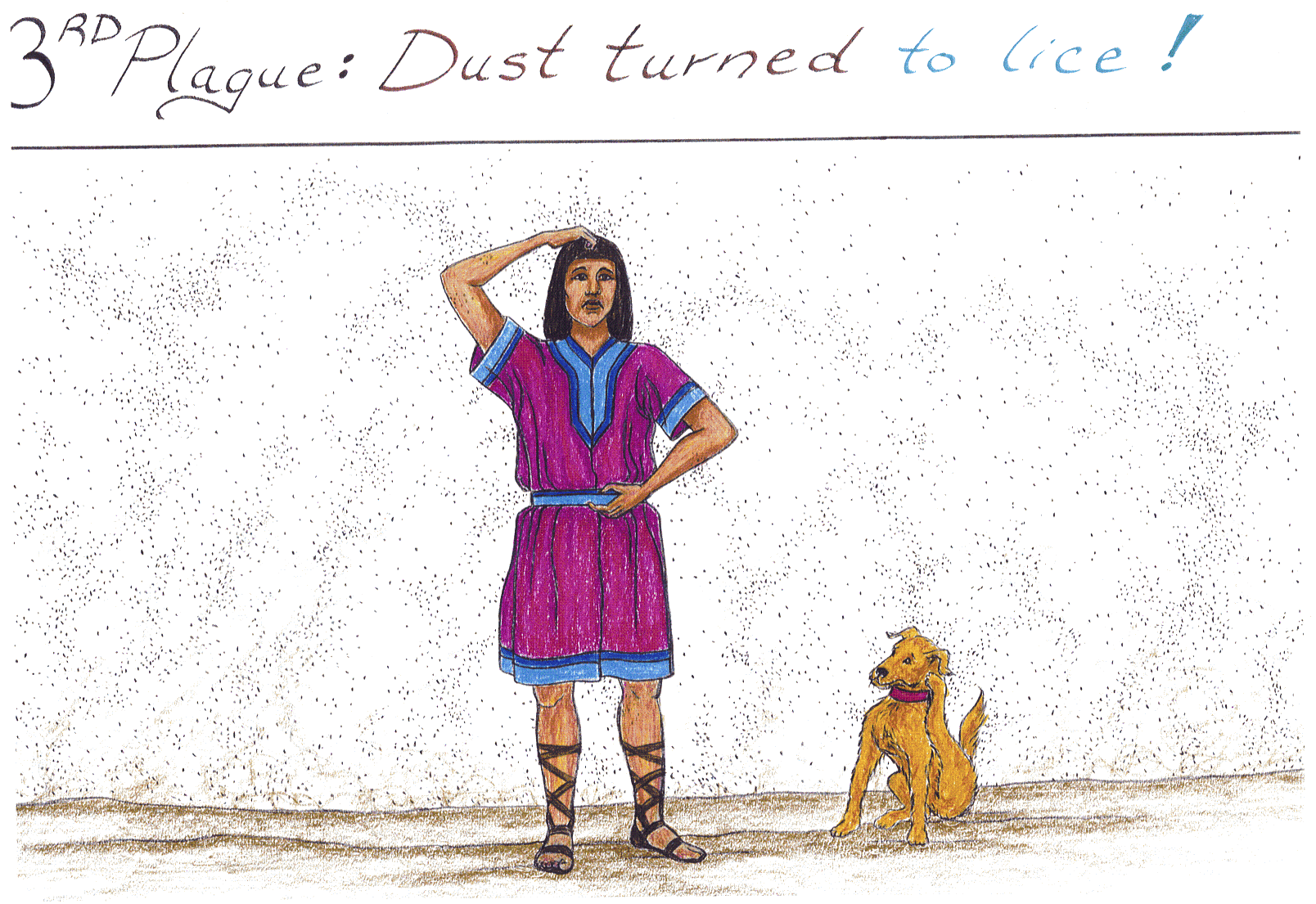
The Third Plague - Exodus 8:16-19 (drawn by Coral)
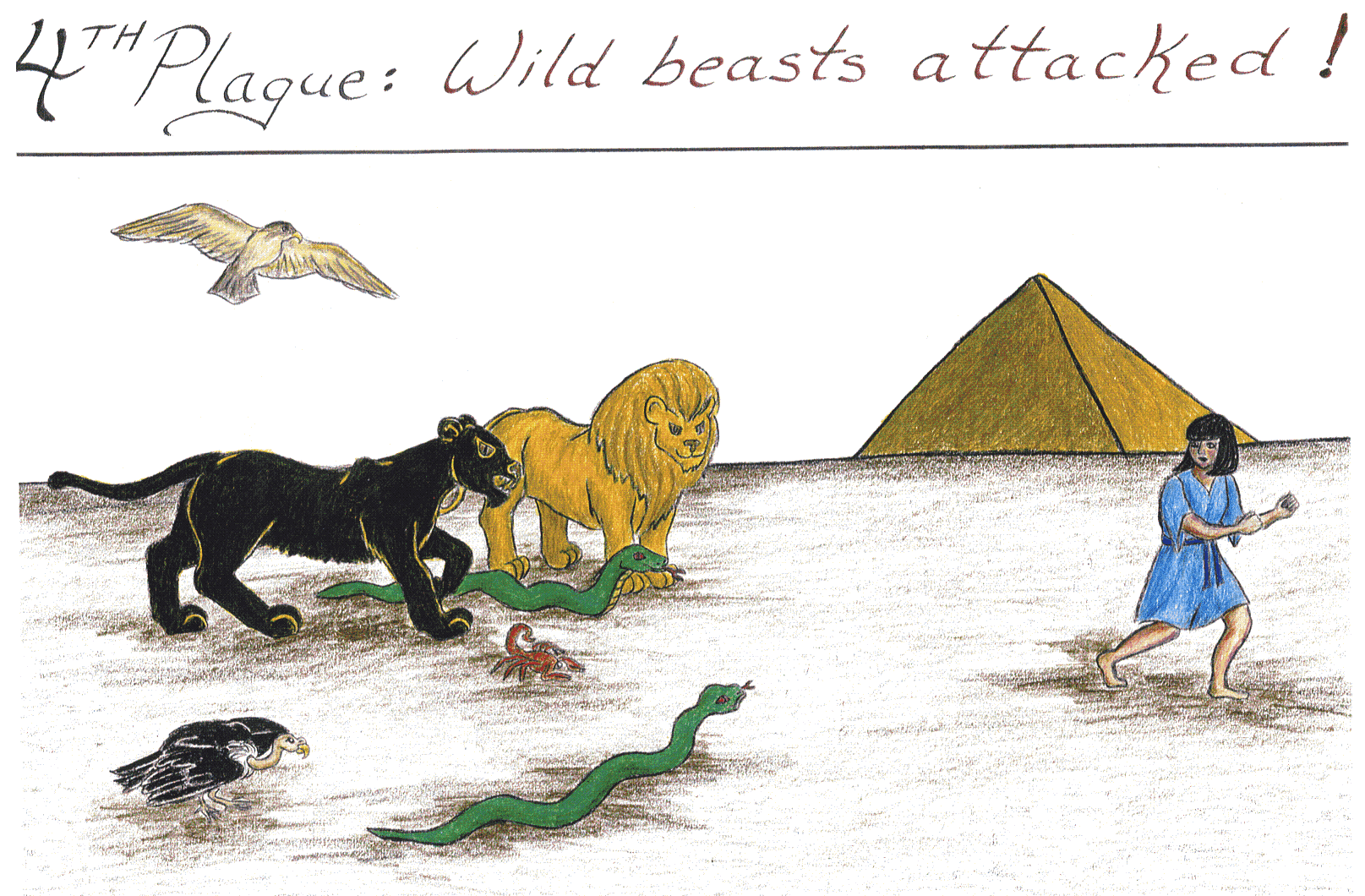
The Fourth Plague - Exodus 8:20-32 (drawn by daughter Rachel)
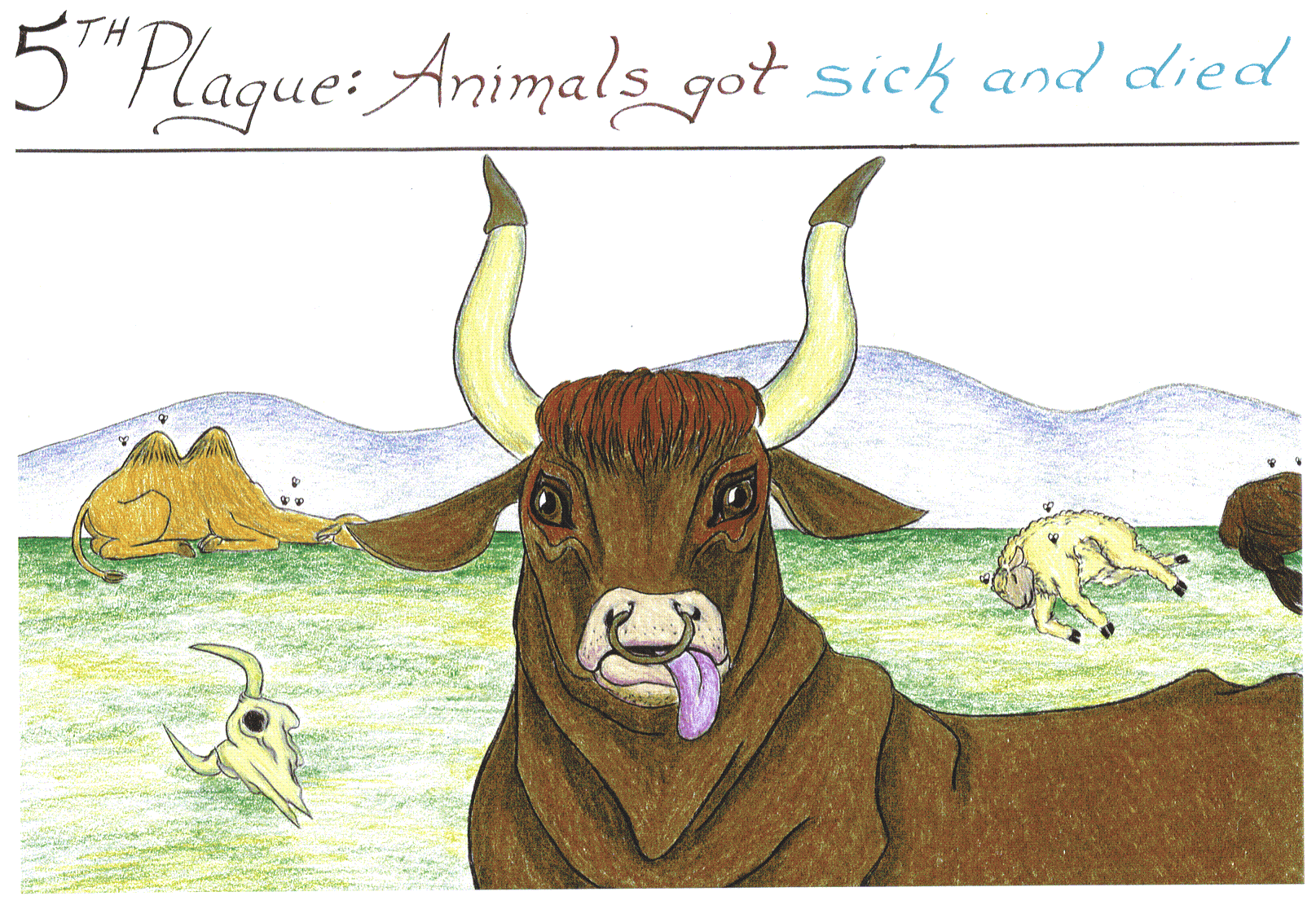
The Fifth Plague - Exodus 9:1-7 (drawn by daughter Rachel)
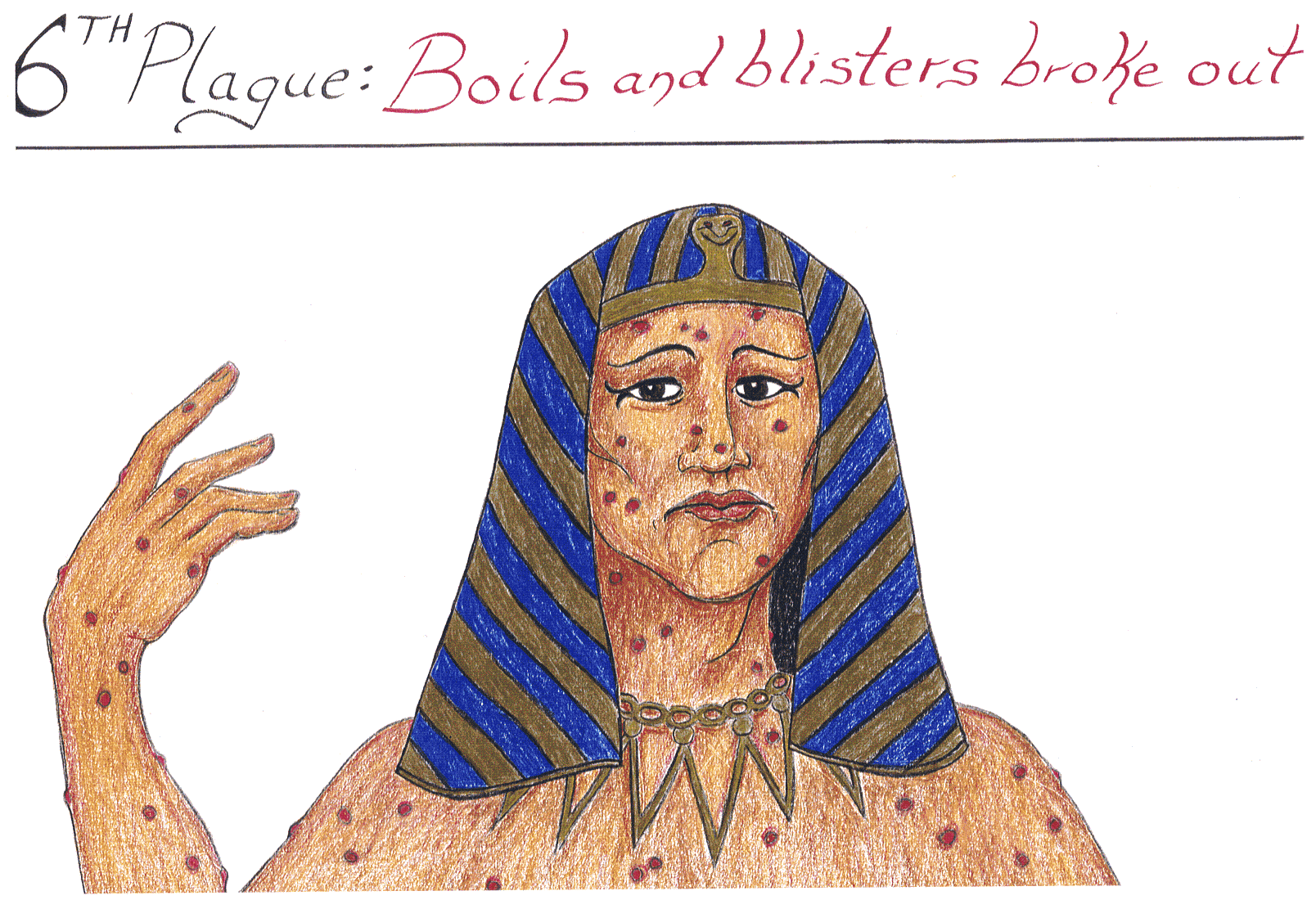
The Sixth Plague - Exodus 9:8-12 (drawn by Coral)
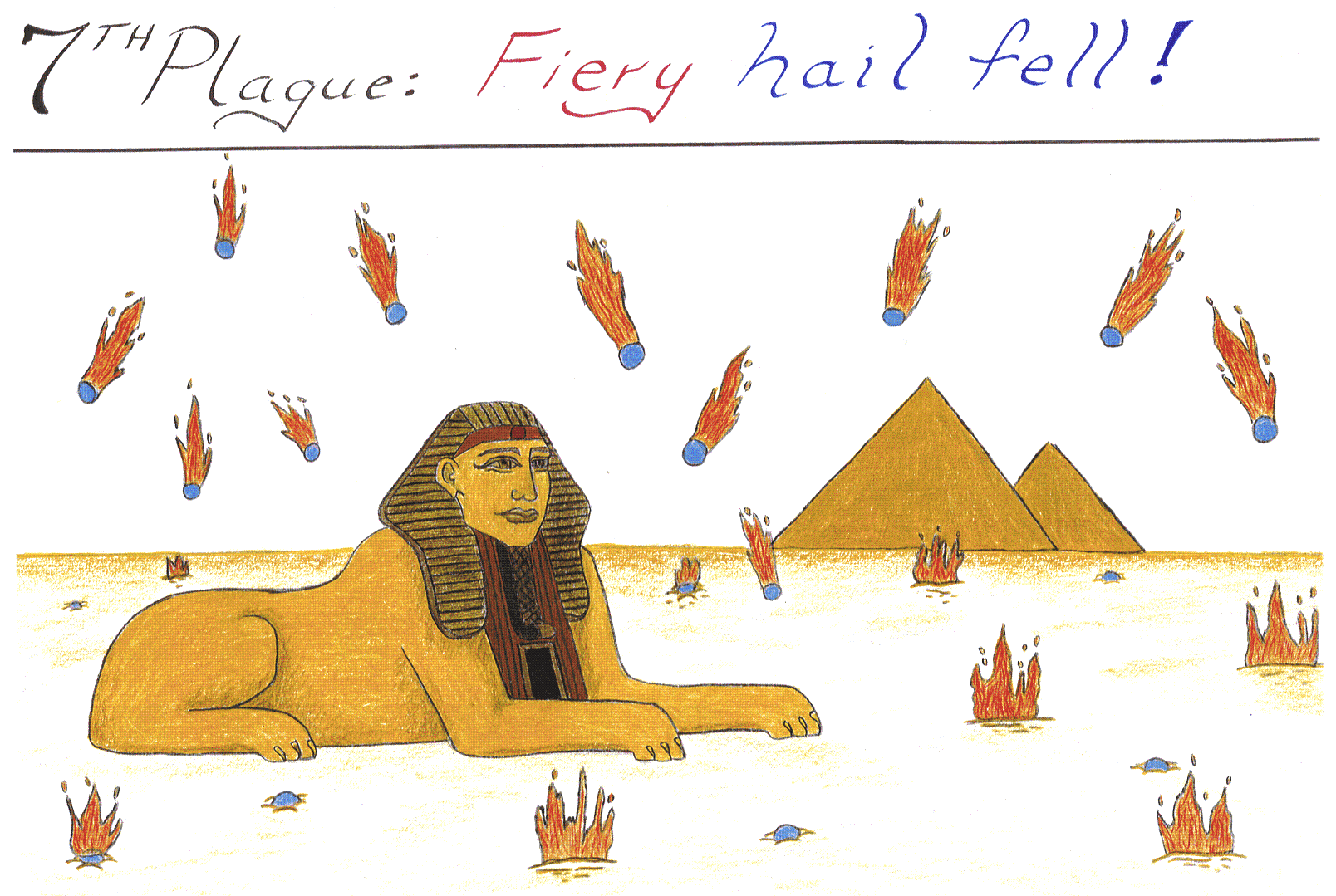
The Seventh Plague - Exodus 9:13-35 (drawn by daughter Arwen)
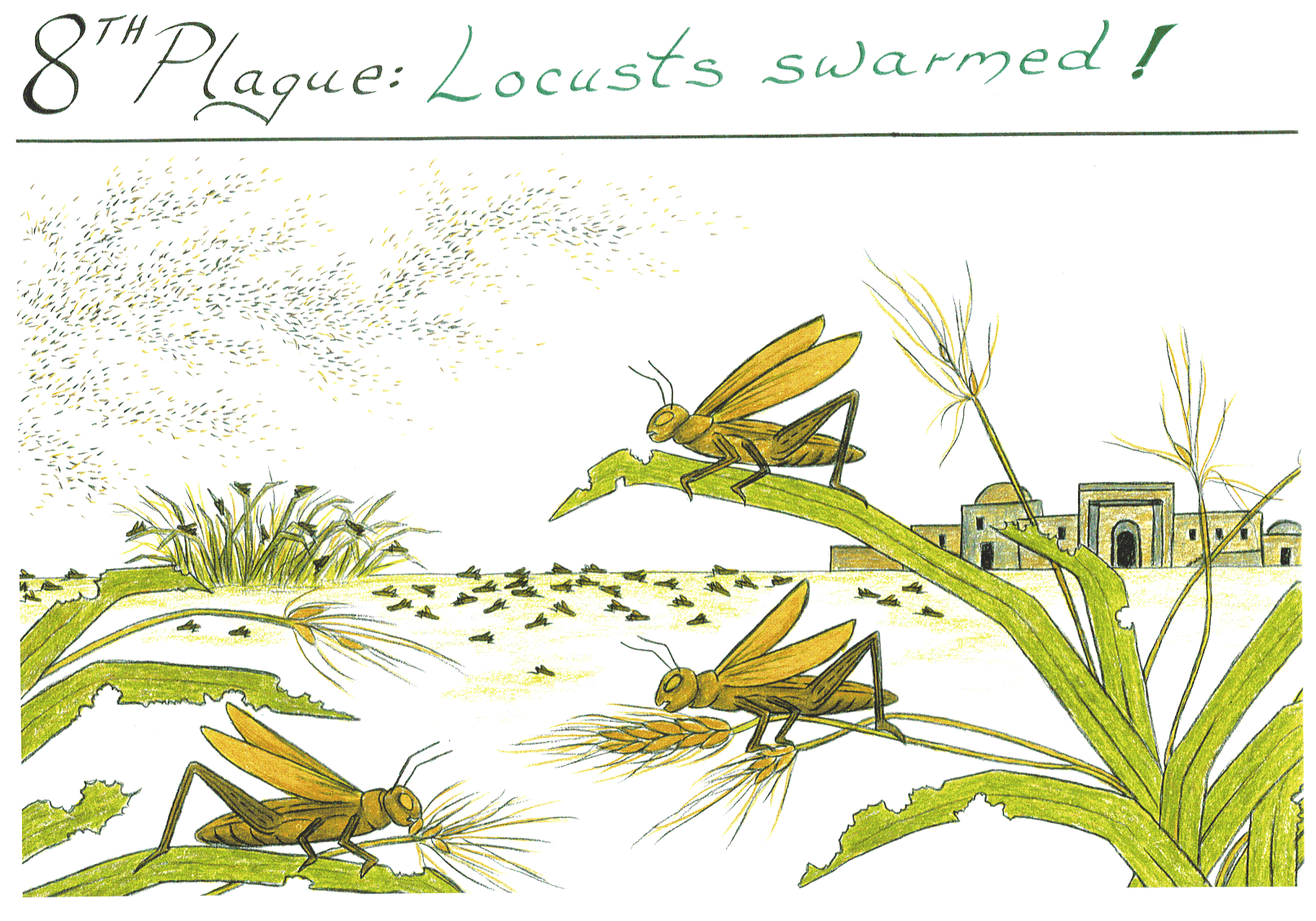
The Eighth Plague - Exodus 10:1-20 (drawn by Coral)
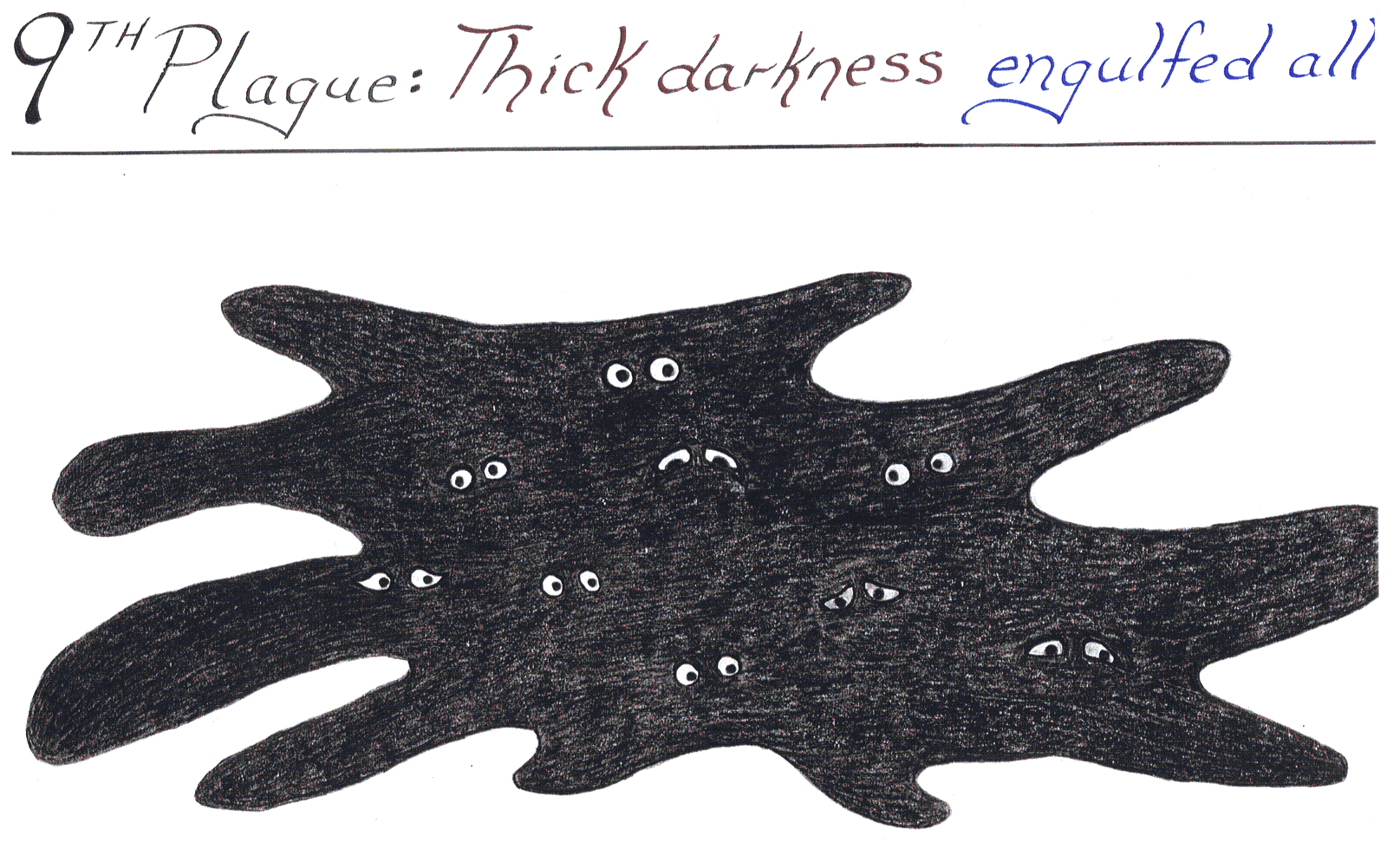
The Ninth Plague - Exodus 10:21-29 (drawn by daughter Arwen)
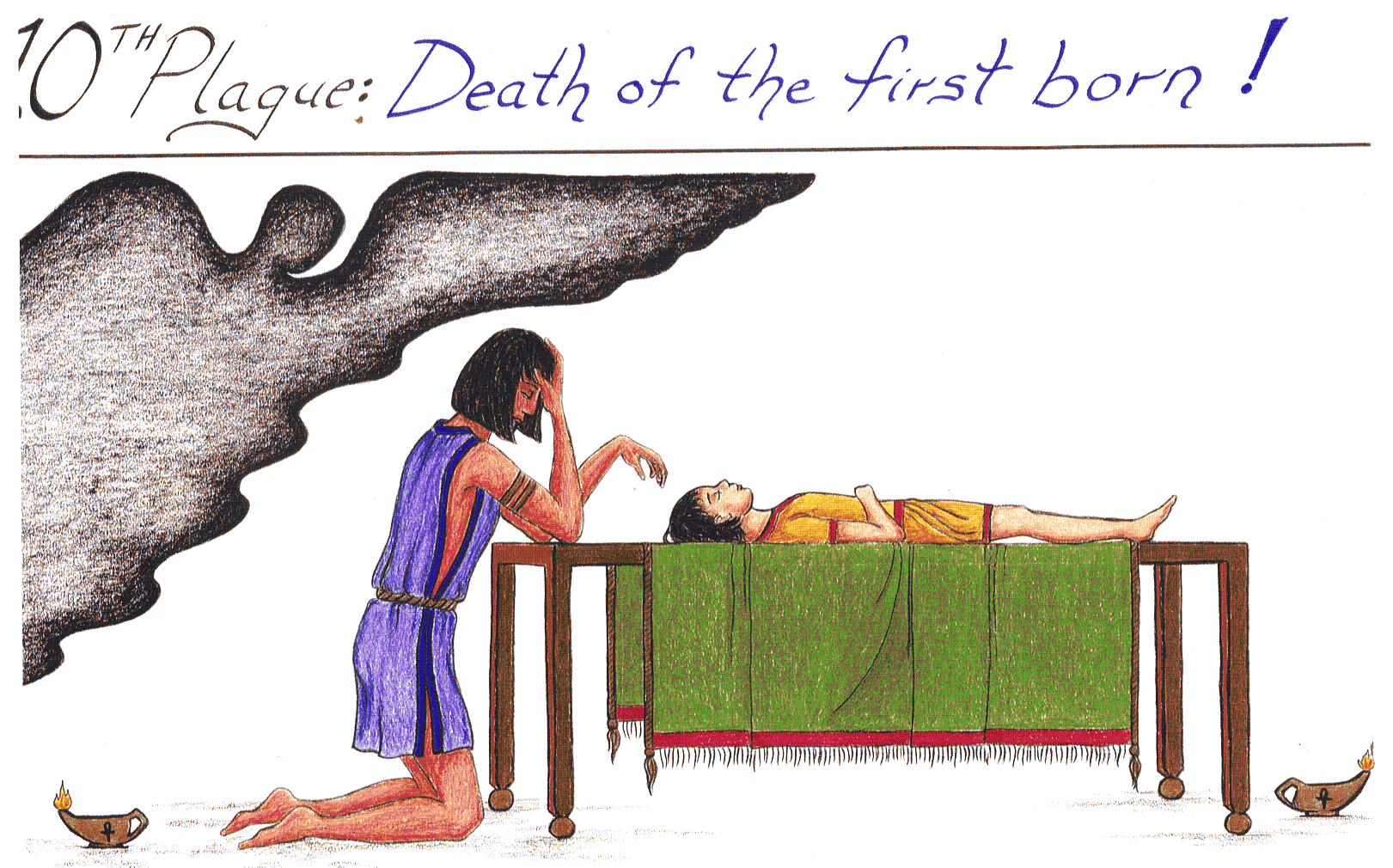
The Tenth Plague - Exodus 11:1-12:30 (drawn by Coral)
* The Haggadah, continued
After each plague, Pharaoh promised to let the people go, but each time, he changed his mind and broke his promise. So the Lord punished the Egyptians with the tenth and most terrible plague - the Killing of the First Born. Only the Israelites were saved. They were told to mark their doorposts with lamb's blood, so that the plague would pass over their homes.
After seeing his own son die, Pharaoh finally let the people go. The Jews departed for the Promised Land rejoicing that four hundred years of slavery were over! However, the Pharaoh changed his mind once more, and ordered his army of chariots to bring them all back.
When the Israelites saw the army chasing them, they were afraid for there was no place to go except into the Red Sea. But the Lord caused a great wind to part the waters so that the people could cross over on dry ground.
Just as they safely reached the shore, the waters came together, drowning all the Egyptian soldiers.
The Lord had saved them. But before the people could enter Canaan, they had to learn to follow God's Laws. So the Lord gave Moses the Torah, with its message of peace and justice for all mankind.
After forty years, the Hebrew people entered the Promised Land, with the Lord's commandments in their hearts, and a prayer of thanksgiving on their lips.
All drink the second cup of wine (take the second sip).
7. Rachats: (Washing of the Hands with a Blessing)
This section may be omitted.
The leader says:
Barukh atah, Adonay Eloheynu, Melekh ha-olam, asher qidd'shanu b'mits'wothayw w'tsiwanu al-n'tiylath yadayim.
Blessed are you, O Lord our God, King of the Universe, who has sanctified us by your commandments, and commanded us concerning the washing of hands.
As the washing bowl is brought to each of us, we dip our hands into the water and wipe them on the towel. This is a symbolic act of purification done before we partake of this holy meal. Have a bowl of water and towel taken to everyone at the table so that they may symbolically wash their hands.
8. Motziy Matzah: (Blessing of the Unleavened Bread)
A double blessing is said over the unleavened bread. The leader takes half of the broken Matzah and blesses it saying:
Barukh atah, Adonay Eloheynu, Melekh ha-olam, ham-motsiy lechem, min-ha-arets.
Blessed are you, O Lord our God, King of the Universe, who brings forth bread from the Earth.
Barukh atah, Adonay Eloheynu, Melekh ha-olam, asher qidd'shanu b'mits'wothayw w'tsiwanu al-akhilath matzah.
Blessed are you, O Lord our God, King of the Universe, who has sanctified us by your commandments, and commanded us to eat the unleavened bread.
The leader tears a chunk from the unleavened bread, and passes it around so that all may do the same. All eat the Matzah.
9. Maror: (Eating of the Bitter Herbs)
All eat the bitter herbs (horseradish) by placing a small amount of horseradish onto a Matzah (cracker or bread), and eating it. It may also be dipped into the Charoseth (the spicy apple and raisin salad) before eating it.
10. Korekh: (Eating of the Hillel Sandwich)
This section may be omitted.
We may make a "Hillel Sandwich" by putting the horseradish between two pieces of Matzah. This was done by the sage, Hillel, to literally observe the Biblical command of eating Maror and Matzah together at the Passover.
11. Shul'chan Orekh: (The Meal)
All eat the meal (and sing or listen to music). All but the last half loaf of unleavened bread (reserved from the breaking of the Matzah at the onset of the meal) may be eaten. Refill the wine glasses after the meal for the Barekh. Celebrate the feast!
12. Tsafun: (The Afikomen - The Desert)
In Jewish tradition, the last (hidden) half of unleavened bread is distributed and served as the desert (after which no more food may be consumed). However, for our Christian Wyndstar celebration, we will reserve this portion of Matzah for the Barekh.
Therefore, omit this section.
13. Barekh: (The Grace after the Meal)
The leader elevates the cup of wine, and says:
Holy God, mighty Lord, the fountain of all holiness; you bring light from darkness, life from death, speech from silence. We worship you for our lives and for the world you gave us. We thank you for the new world to come and for the love that will rule all in all.
We praise you for the grace shown to Israel, your chosen, the people of your promise: the rescue from Egypt, the gift of the promised land, the memory of the fathers, the homecoming from exile, and the prophets' words that will not be in vain.
In all this, we bless you for your only begotten Son, who fulfilled and will fulfill all your promises, who at your Passover took bread and wine and blessed them, instituting the Holy Sacrament of his precious Body and Blood.
Therefore, O God, we remember the incarnation of your Son: his human birth and the covenant he made with us. We remember the sacrifice of his life: his eating with outcasts and sinners, and his acceptance of death.
But chiefly we remember his rising from the tomb, his Ascension to the seat of power, and his sending of the holy and life-giving Spirit.
We cry out for the resurrection of our lives, when Christ will come again in beauty and power to share with us the great and promised feast.
Join our prayers with those of your servants of every time and every place, and unite them with the ceaseless petitions of our great High Priest until he comes as victorious Lord of all.
Through him, with him, in him, in the unity of the Holy Spirit, all honor and glory is yours, Almighty Father, now and forever. Amen.
The leader tears a chunk from the last remaining half loaf of unleavened bread (the afikomen), and passes it around so that all may do the same. Together, all eat the Matzah, and drink the third cup of wine (take a third sip).
14. Hallel: (Reciting or Singing of the Hallel Psalm)
All recite the Hallel Psalm (Psalm 113) in unison:
Halleluyah!
Give praise, you servants of the LORD,
praise the name of the LORD.
Let the name of the LORD be blessed,
from this time forth forevermore.
From the rising of the sun to its going down,
let the name of the LORD be praised.
The LORD is high above all nations,
and his glory above the Heavens.
Who is like the LORD our God, who sits enthroned on high,
but stoops to behold the Heavens and the Earth?
He takes up the weak out of the dust
and lifts up the poor from the ashes.
He sets them with the princes,
with the princes of his people.
He makes the woman of a childless house
to be a joyful mother of children.
15. Elijah's Cup: (The cup of the Prophet)
The children open the door to see if Elijah has come. Elijah, in the Jewish tradition, is the long expected Messenger of the final redemption of mankind from all oppression (the Messenger of Hope).
All drink the fourth cup of wine (take a fourth sip) in honor of Elijah.
16. Nir'tsah: (Conclusion)
The leader says:
As we have been privileged to observe this Seder meal, may all of us be privileged to observe it again next year. And may it be God's will to preserve us in life and in good health.
May the Spirit of this Festival remain with us throughout the coming year, to inspire us with hope, and give us the strength and encouragement to do God's will.
May Zion and all God's people be blessed with peace, and may we live together in harmony with all Creation. Amen.
The Seder observance is traditionally concluded with everyone proclaiming in unison: “Next year in Jerusalem!” However, as Christians, we are celebrating this in remembrance of the Lord’s Last Supper in which he instituted a New Covenant in fulfillment of the Old Covenant. We look to the coming of His Kingdom on Earth as it is in Heaven. And so, for our Christian celebration we may all say together: "Next year in the New Jerusalem" or, as we proclaim at the end of our Wyndstar Haggadah:
Next year at Wyndstar!
